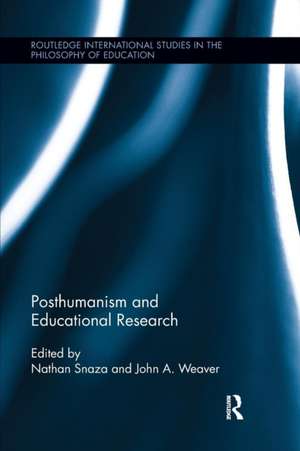Posthumanism and Educational Research: Routledge International Studies in the Philosophy of Education
Editat de Nathan Snaza, John Weaveren Limba Engleză Paperback – 18 noi 2016
| Toate formatele și edițiile | Preț | Express |
|---|---|---|
| Paperback (1) | 370.35 lei 6-8 săpt. | |
| Taylor & Francis – 18 noi 2016 | 370.35 lei 6-8 săpt. | |
| Hardback (1) | 1161.28 lei 6-8 săpt. | |
| Taylor & Francis – 16 sep 2014 | 1161.28 lei 6-8 săpt. |
Din seria Routledge International Studies in the Philosophy of Education
-
 Preț: 302.18 lei
Preț: 302.18 lei -
 Preț: 272.12 lei
Preț: 272.12 lei - 9%
 Preț: 934.96 lei
Preț: 934.96 lei - 8%
 Preț: 382.22 lei
Preț: 382.22 lei -
 Preț: 303.94 lei
Preț: 303.94 lei -
 Preț: 478.51 lei
Preț: 478.51 lei -
 Preț: 316.65 lei
Preț: 316.65 lei - 18%
 Preț: 1218.89 lei
Preț: 1218.89 lei - 18%
 Preț: 1160.32 lei
Preț: 1160.32 lei - 13%
 Preț: 350.29 lei
Preț: 350.29 lei - 18%
 Preț: 701.69 lei
Preț: 701.69 lei - 18%
 Preț: 1000.45 lei
Preț: 1000.45 lei -
 Preț: 476.60 lei
Preț: 476.60 lei -
 Preț: 478.16 lei
Preț: 478.16 lei -
 Preț: 248.44 lei
Preț: 248.44 lei -
 Preț: 455.78 lei
Preț: 455.78 lei -
 Preț: 447.57 lei
Preț: 447.57 lei - 18%
 Preț: 1052.35 lei
Preț: 1052.35 lei - 26%
 Preț: 708.55 lei
Preț: 708.55 lei - 18%
 Preț: 1000.27 lei
Preț: 1000.27 lei -
 Preț: 456.77 lei
Preț: 456.77 lei - 18%
 Preț: 1228.07 lei
Preț: 1228.07 lei -
 Preț: 450.45 lei
Preț: 450.45 lei -
 Preț: 453.89 lei
Preț: 453.89 lei -
 Preț: 479.47 lei
Preț: 479.47 lei -
 Preț: 427.99 lei
Preț: 427.99 lei -
 Preț: 376.10 lei
Preț: 376.10 lei - 18%
 Preț: 1164.75 lei
Preț: 1164.75 lei - 18%
 Preț: 1163.66 lei
Preț: 1163.66 lei - 18%
 Preț: 1160.47 lei
Preț: 1160.47 lei -
 Preț: 477.40 lei
Preț: 477.40 lei - 18%
 Preț: 1054.75 lei
Preț: 1054.75 lei - 25%
 Preț: 938.52 lei
Preț: 938.52 lei - 18%
 Preț: 998.71 lei
Preț: 998.71 lei - 18%
 Preț: 1114.64 lei
Preț: 1114.64 lei -
 Preț: 455.78 lei
Preț: 455.78 lei - 13%
 Preț: 349.81 lei
Preț: 349.81 lei - 13%
 Preț: 349.34 lei
Preț: 349.34 lei - 18%
 Preț: 1062.98 lei
Preț: 1062.98 lei - 26%
 Preț: 764.20 lei
Preț: 764.20 lei
Preț: 370.35 lei
Nou
Puncte Express: 556
Preț estimativ în valută:
70.88€ • 73.72$ • 58.51£
70.88€ • 73.72$ • 58.51£
Carte tipărită la comandă
Livrare economică 12-26 aprilie
Preluare comenzi: 021 569.72.76
Specificații
ISBN-13: 9781138286979
ISBN-10: 1138286974
Pagini: 218
Dimensiuni: 152 x 229 x 12 mm
Greutate: 0.32 kg
Ediția:1
Editura: Taylor & Francis
Colecția Routledge
Seria Routledge International Studies in the Philosophy of Education
Locul publicării:Oxford, United Kingdom
ISBN-10: 1138286974
Pagini: 218
Dimensiuni: 152 x 229 x 12 mm
Greutate: 0.32 kg
Ediția:1
Editura: Taylor & Francis
Colecția Routledge
Seria Routledge International Studies in the Philosophy of Education
Locul publicării:Oxford, United Kingdom
Public țintă
Postgraduate and UndergraduateCuprins
Foreword by Dennis Carlson Introduction: Education and the Posthumanist Turn Nathan Snaza and John Weaver Part I: Humanism, Posthumanism, and Educational Research 1. Toward a Genealogy of Educational Humanism Nathan Snaza 2. Researching the Posthuman Paradigm: The "Subject" as Curricular Lens Brad Petitfils 3. Posthumanist Education and Animal Interiority Marla Morris 4. Educational Policy-Making for Social Change: A Post-Humanist Intervention Helena Pedersen 5. "Approximate-Rigorous-Abstractions": Propositions of Activation for Posthumanist Research Stephanie Springgay Part II: Attuning to the More Than Human Complexities of the Classroom 6. Ecologies of Praxis: Teaching and Learning Against the Obvious Nikki Rotas 7. Losing Animals: Ethics and Care in a Pedagogy of Recovery Alyce Miller Part III: Ecological Aesthetics 8. Affirmations and Limitations of Rancière’s Aesthetics: Questions for Art and its Education in the Anthropocene Jan Jagodzinski 9. Dark Posthumanism, Unthinking Education, and Ecology at the End of the Anthropocene Jason Wallin Part IV: What Posthumanist Education Will Have Been 10. Undoing Anthropocentism in Educational Inquiry: A Phildickian Space Odyssey? Noel Gough 11. Resisting Becoming a Glomus Body Within Posthuman Theorizing: Mondialisation and Embodied Agency in Educational Research Annette Gough 12. To What Future Do the Posthuman and Posthumanism (Re)turn Us; Meanwhile, How Do I Tame the Lingering Effects of Humanism? John Weaver
Recenzii
" What is evident by the end of the book is that posthumanism is a philosophical and interllectual form of inquiry - and Weaver challenges the broad field of education to release itself not only from the constraining forces of humanism, but also what Snaza and Weaver called in their introduction methodocentrism. Weaver is boldly stating that education and educational inquiry needs to become more interllectual; posthumanist philosophy and inquiry is one rhizomatic pathway that may unleash possibilities long since forgotten, reminding us of the interconnected nature of humans, animals, objects, and forces within educational inquiry."
- Paul William Eaton, The Review of Higher Education, Spring 2016
"In summary, this volume is a valuable contribution both to furthering the discussion on how post-humanism can help change educational theory and practice."
- Stefan Herbrechter Coventry University, UK, Educational Philosophy and Theory, 2016
- Paul William Eaton, The Review of Higher Education, Spring 2016
"In summary, this volume is a valuable contribution both to furthering the discussion on how post-humanism can help change educational theory and practice."
- Stefan Herbrechter Coventry University, UK, Educational Philosophy and Theory, 2016
Descriere
Posthumanism challenges some of the most foundational concepts in educational theory and has implications within educational research, curriculum design and pedagogical interactions. In this volume, a group of international contributors use posthumanist theory to present new modes of institutional collaboration and pedagogical practice. They position posthumanism as a comprehensive theoretical project with connections to philosophy, animal studies, environmentalism, feminism, biology, queer theory and cognition.














